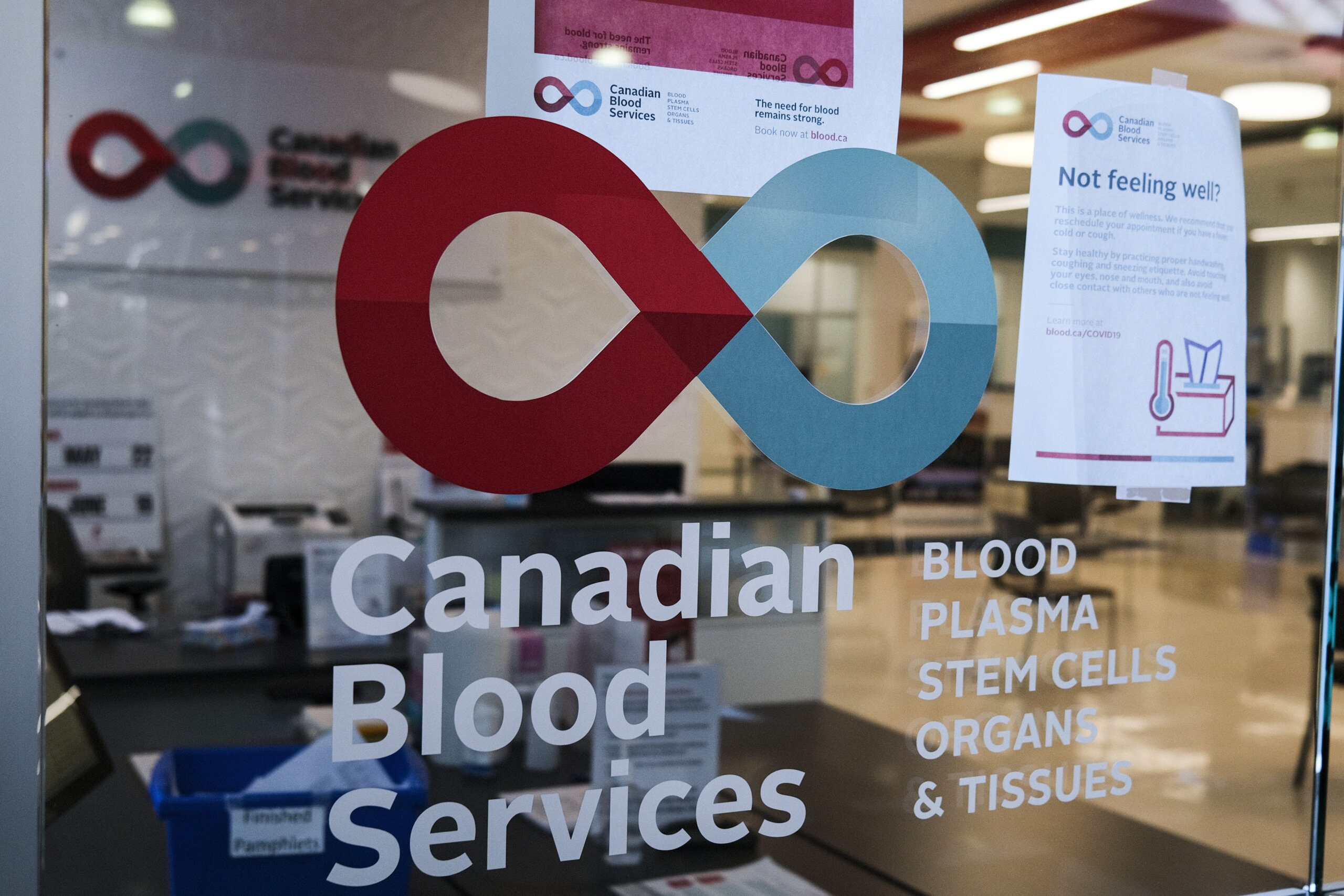This morning, Canadian Blood Services (CBS) issued an apology to LGBTQ2S+ people across Canada for the harms caused by previous blood donation rules—which historically banned gay and bisexual men, as well as many trans people, from donating blood.
“Today’s been … a day many LGBTQ2S+ people have been waiting for for a long time,” Dr. Graham Sher, CEO of CBS said as he delivered this morning’s apology. “We regret that for many years the former policy contributed to discrimination, homophobia, transphobia and HIV stigma within society.”
He later said, “We acknowledge how this policy enforced the harmful public perception that someone’s blood is less safe [due to their sexual orientation].”
Canada’s blood donation rules have evolved over time, with the latest changes put into place in September 2022. In the mid-1980s, in response to the AIDS crisis, CBS’s predecessor, Canadian Red Cross Blood Transfusion Service, introduced rules permanently barring all men who had had sex with men from donating blood and plasma.
It wasn’t until the 2010s that the permanent deferral policy was modified to a time-based deferral of five years. The period was lessened over time down to one year, then, eventually, three months. In September 2022, CBS removed criteria specific to men who have sex with men, opting instead to screen all donors based on sexual behaviour—regardless of their gender or sexual orientation.
Today, all potential donors are asked whether they’ve had sex with new or multiple partners in the last three months. If they answer yes, they will be asked if they have had anal sex. Donors who have will be asked to defer their donation by three months.
In an interview granted to Xtra ahead of the apology, Sher said that these changes were an important milestone. But, he acknowledges, “the adoption of the policy didn’t erase the harm that the previous policy had contributed to. We knew work must follow, in order for us to continue to build trust.”
CBS collaborated with an advisory committee made up of members of various LGBTQ2S+ groups, as well an internal group of queer and trans CBS employees, in order to develop the apology.
Michael Kwag was one of the members of the advisory committee. He is also the director of the Community-Based Research Centre (CBRC), an organization that promotes the health of LGBTQ2S+ people in Canada.
Kwag says that while this apology is historic, and a significant way for CBS to take accountability, it should be seen as the beginning of an ongoing process to make blood donation in Canada more equitable.
Several barriers still exist to giving blood, which affect many LGBTQ2S+ people. People who engage in sex work, for example, are still asked to defer their donations, as are people who have multiple partners and who engage in anal sex—even if those partners are not new.
Anyone who uses PrEP—or who has an HIV-positive partner— is also asked to defer, regardless of their HIV status, a criterion that affects many queer men. Kwag, a PrEP user himself, points out that he’s a gay man who leads one of Canada’s largest health organizations, and is taking PrEP as a science-backed step to protect his health and his community—yet he is barred from donating blood as a result.
Many men who have sex with men are also still barred from donating organs and tissues, he says.
Trans people similarly face ongoing barriers to donation. While binary trans donors can now register to donate with their accurate genders, they can only register using the names listed on their legal identification. Non-binary donors are also still required to choose a binary sex designation when donating, as CBS’s computer system does not allow donors to register with a neutral marker.
Kwag says that beyond donation policies, work still needs to be done in order to make donation centres inclusive and welcoming to queer and trans donors. Even after behaviour-based policies were put in place, he’s heard from LGBTQ2S+ people who have reported feeling singled out at donation centres. One queer donor recently told him that during the screening process, they were told by an employee that they “didn’t look like someone with HIV.”
Sher concedes CBS’s work is not done. “What I hope this apology will accomplish is to be a commitment from this organization, that we are on a journey … to earn trust to build relationships,” he says.
Sher cities persistent barriers to trans donors, as well as Black and Indigenous donors, as places where policy still needs to develop.
Historically, donors from Haiti and from several African countries were barred from becoming donors due to rates of HIV and malaria in those regions. Later, the rules were altered to a time-based deferral. Today, anyone who has spent time in a malaria-endemic region, including several African countries, is asked to defer their donation.
CBS has also faced criticism regarding cultural competency when it comes to communicating with prospective African, Caribbean and Black donors. In 2013, when CBS moved their donor questionnaire online, questions regarding time spent in Africa were accompanied by generic and stereotyping images of landscapes and animals in Africa.
Today, Canada’s blood supply is not sufficiently diverse, and CBS has recently asked for more Black donors to come forward. Advocates have pointed out that calls for Black donors should come with an acknowledgment of the historical harms Black Canadians have faced from CBS.
When asked whether CBS plans to apologize to African, Caribbean and Black communities, Sher explained that remaining barriers need to be removed before a sufficient apology can be issued.
“We don’t have policies in place that target individuals based on identity, but they certainly do based on geography, and that has a disproportionately large impact on Black communities,” he says.
There is currently no Health Canada-approved screening test for Malaria, Sher says, but it is important that CBS pushes for the development of such a test and updates their policies accordingly after one is developed.
“We need to do all of that work before I can say with any degree of confidence that an apology would be part of that work or not,” he says. “So we don’t have any immediate plans in place to issue apologies to others. But we are committed to doing all the work to build relationships to build trust.”
Moving forward, Kwag hopes to see CBS maintain momentum. He credits advocates, researchers and community organizers for getting the policies to where they are today.
“We would not be here today if people hadn’t pushed back and raised their voices on this issue,” he says. “I want to celebrate this moment and this day, but also recognize that there is still more to do.
“I think everyone does appreciate the fact that our blood supply needs to be safe and protected,” Kwag says. “But we need to work toward a future where there are policies around donation that are as evidence-based, inclusive and non-stigmatizing as possible.”


 Why you can trust Xtra
Why you can trust Xtra


